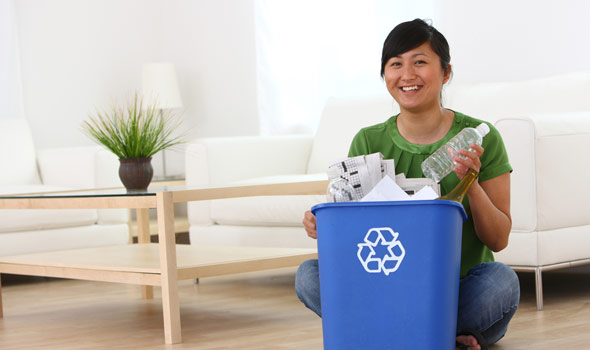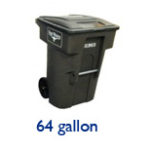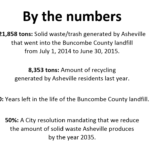When it comes to sustainability and conservation practices, the City of Asheville has proactive goals.
Since its inception in 2008, the City’s Office of Sustainability has worked to reduce our municipal carbon footprint, first by 2% every year, then bumping the goal up to 4% every year starting in 2010. The City installed the LED lights in City Hall with sensors in our buildings that turn off lights when no one is in the room. In addition, we’re using biodiesel in some of our vehicles.
But it’s not just municipal efforts in play. Residents also do their part by participating in the City’s curbside recycling program.
The City began curbside recycling in 1995, with separate bins for glass/cans/plastic and paper. Then in 2012, City of Asheville residents stepped up their recycling game in a big way following the introduction of “Big Blue” 96-gallon carts. The result was a 50% increase in recycling.
Still, there’s more work to do to reduce the amount of solid waste we generate.
In 2014, City Council adopted a resolution to reduce solid waste by 50% by the year 2035. The goal is to be measured from the baseline year of 2010 and result in total reductions of 15% by 2020; 25% by 2025; 40% by 2030; and 50% by 2035.
And in February 2015, the City’s Sustainability Advisory Committee on Energy and the Environment (SACEE) sent a letter City Council’s Planning & Economic Development Committee recommending the City approve a pay-as-you-throw model for residential solid waste management.
What is pay-as-you-throw? Known as PAYT, residents are charged for the collection of municipal solid waste — ordinary household trash — based on the amount they throw away. It creates an economic incentive for citizens to recycle more and to generate less solid waste that goes into the landfill.
Communities utilizing PAYT systems charge residents for municipal solid waste services based on the waste they generate by a bag-based method or a cart-based method.
Take our survey
As the City considers methods to reduce solid waste going to the landfill, we felt it was important to conduct a citizen survey on a number of solid waste reduction strategies. This is an effort to help gauge residents’ interest in PAYT or possibly a composting system, plus find out how well everyone understands how our present recycling and solid waste collection systems work.
“Envisioning a Zero Waste AVL is a goal the City and the Sustainability Office strives for its community,” said Amber Weaver, Asheville’s Chief Sustainability Officer. “Taking a closer look into the waste stream and exploring ways to reduce the amount of solid waste entering the landfill is imperative in meeting the City’s goal of reducing solid waste entering the landfill by 50% in 2035, as well as continuing to reach our carbon reduction goals. What a great opportunity for the residents of Asheville to play a part in the City’s efforts.”
We urge everyone to participate in this survey.
Also, the City has launched a page about our Zero Waste AVL initiatives and PAYT information. Visit it at ZeroWasteAVL.
Asheville is responding to the global and local imperatives for sustainability by determining what sustainability means for this community. The City of Asheville has taken the proactive approach of crafting a community vision for a future for Asheville that is based on sustainability.
The City of Asheville is working with a consultant to analyze strategies to reduce the solid waste stream. The findings and recommendations will be shared with City Council’s Planning and Economic Development Committee and Finance Committee in late 2015/early 2016 for consideration. Implementation of any waste reduction strategies would be integrated into the City’s budget process.
We want to include our citizens every step along the way.
To find out more
For more on the City of Asheville’s Office of Sustainability, visit ashevillenc.gov/Sustainability. Email ZeroWasteAVL@ashevillenc.gov or call Chief Sustainability Officer Amber Weaver at 828-271-6141.


